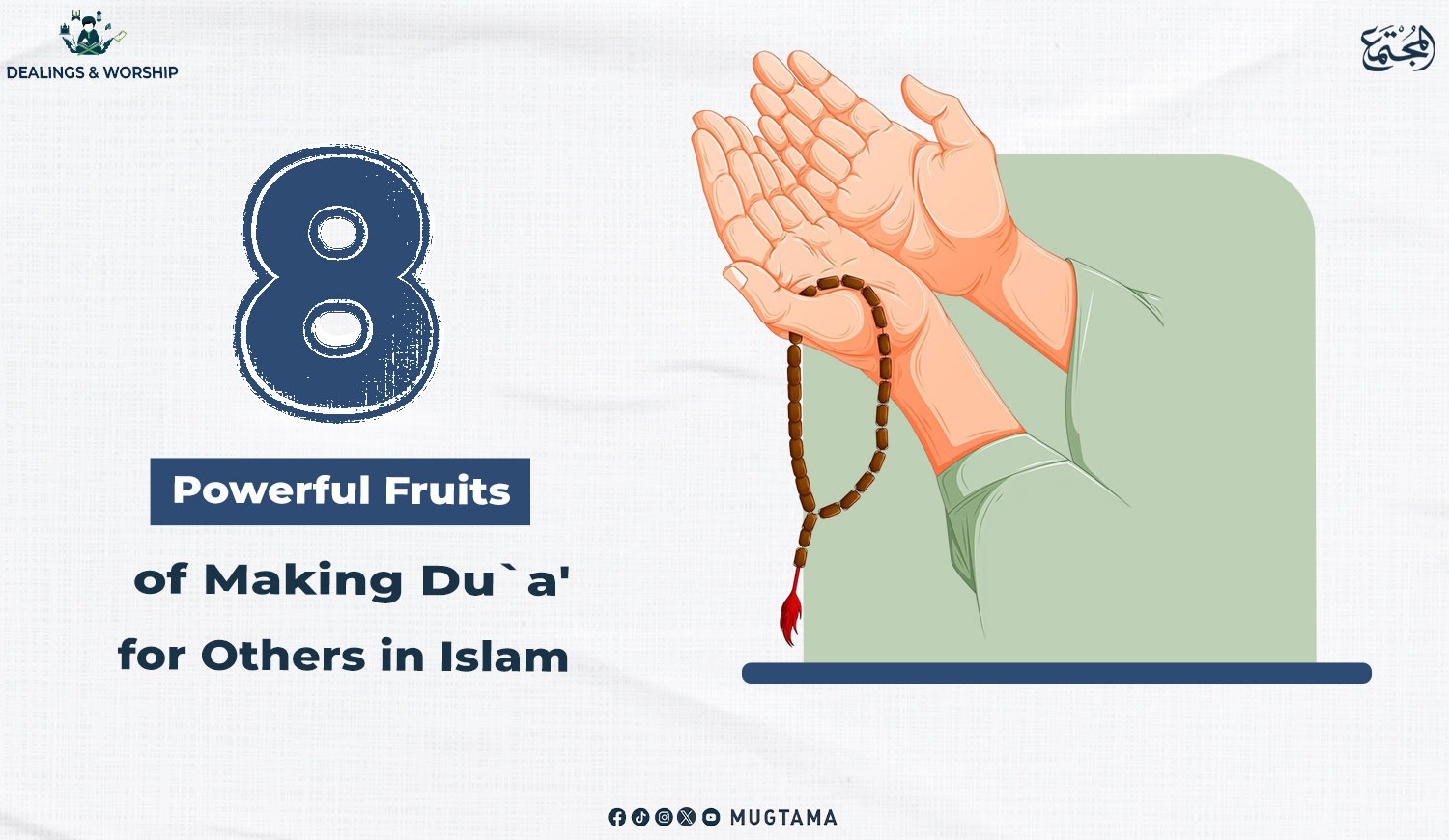8 Powerful Fruits of Making Du`a' for Others in Islam

The Spiritual Solidarity of Supplicating for Muslims
When personal interests dominate
and human bonds fade, supplication for others in their absence remains one of the greatest forms of spiritual solidarity among Muslims. It reassures a
believer’s brother that he is present in his heart, even if absent from his
sight, transcending barriers of time and place so that souls meet in one field
of mercy and purity: the field of supplication (du`a’).
The Fruits of Supplicating for Muslims in their Absence
This practice brings about
numerous fruits, among them are the following:
1-
Following the Example of the Prophets
Looking into the Qur’an, one
finds that Allah mentioned His Prophet Ibrahim (peace be upon him) making
supplication in absence for his parents and the believers: {My Lord! Make me and those ˹believers˺ of my descendants keep up prayer.
Our Lord! Accept my prayers. Our Lord! Forgive me, my parents, and the believers on the Day
when the judgment will come to pass.”} [Ibrahim 14:40–41]
Likewise, Prophet Nuh (peace be
upon him) supplicated: {My Lord! Forgive me, my
parents, and whoever enters my house in faith, and ˹all˺ believing men and women. And increase the wrongdoers only in
destruction.”} [Nuh 71:28]
Our Prophet Muhammad (peace be
upon him) was also commanded by Allah to supplicate and seek
forgiveness for the believers in their absence: { So, know ˹well, O Prophet,˺ that there is no god ˹worthy of worship˺ except Allah. And seek forgiveness for your
shortcomings and for ˹the sins of˺ the believing men and women. For Allah ˹fully˺ knows your movements and places of rest ˹O people˺.} [Muhammad 47:19]
He (peace be upon him) would even
request his companions to pray for him in absence, especially during travel to holy places. In Sunan Abu Dawud, it is narrated from `Umar ibn al-Khattab
(may Allah be pleased with him) who said: I
sought permission of the Prophet (peace be upon him) to perform umrah. He gave
me permission and said: My younger brother, do not forget me in your
supplication.
He (Umar) said: He
told me a word that pleased me so much so that I would not have been pleased if
I were given the whole world.
The narrator
Shu'bah said: I then met Asim at Medina. He narrated to me this tradition and
reported the wordings: “My younger brother, share me in your supplication.”
2- A Mark of True Believers
The believer prays for others in their
absence. Allah Describes the believers: {And those
who come after them will pray, “Our Lord! Forgive us and our fellow believers
who preceded us in faith, and do not allow bitterness into our hearts towards
those who believe. Our Lord! Indeed, You are Ever Gracious, Most Merciful.”} [Al-Hashr
59:10]
Anas Ibn Malik narrated that the
Prophet (peace be upon him) said: “None of you
believes until he loves for his brother what he loves for himself.” (Al-Bukhari and Muslim)
Loving good for one’s brother includes supplicating for him in absence,
just as one would wish others supplicate for him.
3- Reward for Both the One Who Supplicates and the
One Supplicated For
At-Tabarani narrated in Makarim
Al-Akhlaq that Sufyan Ibn `Uyaynah said: “It was said to Ka`b Al-Ahbar:
Who is the forgiven sleeper and the thanked awaked one? He said: A man who
stands at night in prayer and supplicates for his brother in absence while his
brother is asleep. Allah forgives the sleeper because of the supplication of
the one standing in prayer, and thanks the one who supplicated because he
remembered his sleeping brother.”
Similarly, Al-Marwadhi said: “Perhaps
a sleeper is forgiven, while one standing (in prayer) is rewarded.’ It was
asked: ‘How is that?’ He replied: ‘A man prays at night and remembers his
brother who is asleep, so he asks Allah to forgive him. Thus, the one who is
asleep is forgiven, and the one who is praying is rewarded.’”
4- Receiving the Same Goodness One Supplicates For
Abud-Darda’
narrated
that the Messenger of Allah (peace be upon him) said: “There
is no believing servant who supplicates for his brother behind his back (in his
absence) that the Angels do not say: The same be for you too.” (Sahih
Muslim)
5-
Angels Saying “Ameen” to the Supplication
One of the greatest honors of
supplicating for others in their absence is that the angels affirm it by saying
Ameen. Umm Ad-Darda’ narrated: My husband reported that he heard the
Messenger of Allah (peace be upon him) as saying: He
who supplicates for his brother behind his back (in his absence), the Angel
commissioned (for carrying supplication to his Lord) says: Amen, and it is for
you also. (Sahih Muslim)
6- A Guarantee of Answered Supplications
There are numerous texts
guaranteeing that supplications in absence are among the answered ones. Safwan Ibn
Abdullah Ibn Safwan, who was married to the daughter of Abud-Darda’, said: I visited them in Syria and found Umm Ad-Darda’ in the
house, but not Abud-Darda’. She asked, “Are you intending to go on hajj this
year?” “Yes,” I replied. She said, “Make supplication to Allah and ask for good
for us. The Prophet, may Allah bless him and grant him peace, said, ‘The
supplication of a Muslim man for his absent brother is answered. At his head
there is a guardian angel. Whenever he asks Allah to give his brother good, the
angel says, 'Amen, and may you have the same.'” I met Abud-Darda’ in the market
and he said something similar which was related from the Prophet, may Allah
bless him and grant him peace.” (Sahih
Muslim)
In Sunan Abu Dawud, Abdallah B. `Amr
reported that the Messenger of Allah (peace be upon him) said: “The supplication which gets the quickest answer is that
made by one distant friend for another.”
In Musannaf Ibn Abi Shaybah, `Awn
Ibn Abdullah said: “Four supplications are not veiled from Allah: a parent
who is pleased with his son, a just ruler, the supplication of the oppressed,
and the supplication of a man for his brother in absence.”
7-
Purity of the Soul and the Heart
Supplication in absence reflects
the purity of the one who does it and the cleanliness of his heart. It
demonstrates his freedom from selfishness, envy,
or animosity. It proves he loves good for others as he loves for himself.
Moreover, it nurtures in him inner peace, contentment, and a
universal love of good for humanity.
8- Strengthening the Unity of the Ummah
Supplication in absence
strengthens the bonds of brotherhood among
Muslims. It is born from love and compassion, expressing empathy and a sincere
desire for cooperation. This builds a strong, cohesive society based on mercy,
love, and unity, while
reducing disputes, conflicts, and divisions.
Also Read:
- Persistence in Du’a: Why Is My Prayer Not Answered?
- Nurturing Preachers in Islamic Civilization (9) Relying upon Allah and Seeking His Help
- 5 Foundations of Tolerance in Qur’an
-------------------------------------------------------------
Read the Article in Arabic











